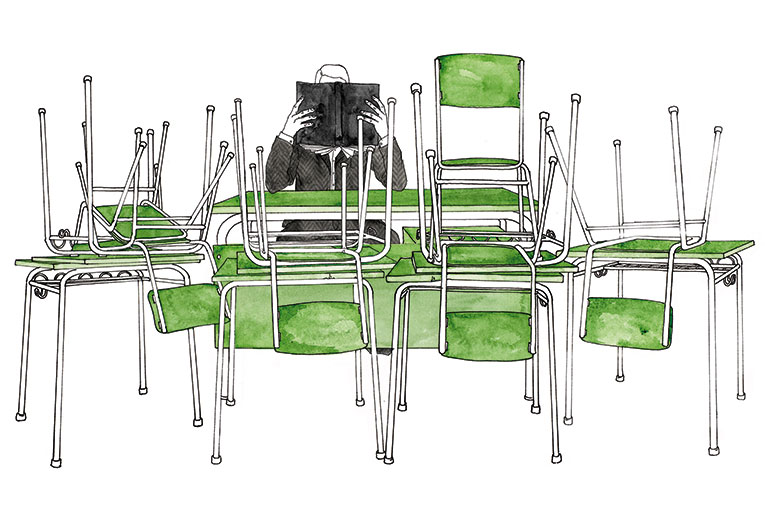
|
When I studied biochemistry at the Universitat Rovira i Virgili I remember having a teacher who came to class, sat down and started to read a textbook. Literally. I did the same thing I had done other times during my university studies, I started skipping class. I asked for a classmate’s notes, and studied the subject on my own. Indeed, in that specific occasion I asked several students to do the same, in order to boycott the class and denounce the attitude of an inept teacher – I still do not understand how he was tolerated by the department (immobility of the university institution, I guess). My classmates did not want to join the initiative. It looks like going to class was very important, something just short of sacred, as if it were essential to being a good student. I did not understand. If the goal is learning, isn’t it more efficient to study directly from a good book and borrowed notes instead of wasting time listening to a bore and writing mechanically without understanding anything? Maybe this sounds irreverent, but I was in Boston last week, talking to Israel Ruiz, vice president of MIT and creator of the online education platform EdX, and he said: «During the last two years of university, I did not go to class. I was bored. I asked for notes and started working in a company. And that was in the nineties, if it was now, with all the educational resources there are online, I would have probably stopped going in my first year». And see how far Israel has come! You think I’m being shallow hinting that it is not so important to go to class in university? Not at all. The world has changed, and university should follow. 30% of students enrolled at MIT in science and technology degrees do not go to class. They study at home, or on campus with other students, they watch videos and materials prepared by the teacher, get involved in research and laboratory projects, or create a company. They make better use of their time, and end up being the best prepared in the world. «Hands-on education is part of MIT’s DNA», says Israel Ruiz, and he adds «we are talking about a complete redistribution of the education and learning time of a student». And what is the base for this redistribution? Forget the Bologna reforms or state laws, they are everything but. The real change that is currently taking place in education is the concept of flipped classrooms. I mean, so far the normal process was that students would first go to class and listen to the teacher and then studied and did their homework. With the digital resources we have now, that makes no sense. More and more teachers will record their lessons on video, hang them in the subject intranets; students will see them when they prefer, will be able to stop and repeat if required, or skip bits they already know, and go to the classroom to practice, discuss with the teacher and other students, organize working groups and make much better use of their time than passively attending class. This is not science fiction. Professor Michael Cima at MIT has completely flipped his electronics course, and he is now evaluating the results and confirming that students learn more with the new methodology. «I don’t feel so pressured in a lecture to cover all the material. It’s ok for me to stop and talk to students, take questions or do examples. If they pass it [a test], they know instantly because the computer grades it», Cima says in an MIT website video. By the way, computer tests with immediate results are also part of the revolution in education that new technologies are facilitating: several experiments have shown that if, after doing a test computer, the students can immediately see where they made a mistake, they learn much more than when the teacher gives the corrected test two weeks later. Not only that; with the educational software being currently developed, the software is tailored to the particular needs of each pupil: the software analyses the results and identifies those points the student needs to reinforce, and then it insists on them. Even more: having all these computerized data about student progression year after year will allow us to have a much clearer idea about their academic profile, and even to apply big data tools to make large studies and assess what the most efficient way to teach is. Maybe now I really am going too far… But coming back to the concept of flipped classrooms, there is now no excuse for universities and savvy teachers not to apply it. Now everyone has a computer, internet access, uploading videos is easy as pie, cameras are cheap… It’s time to turn education around, and students from the universities that choose not to do so will be less prepared. A caveat: I’m not saying that everything should be done completely online and teachers should lose relevance. MOOC models (Massive Open Online Courses), where everything is done exclusively online, are fabulous for adult education (I have enrolled in fantastic courses on nutrition in EdX and behavioural economics in Coursera, with Dan Ariely), but impact assessments show they are not a panacea. They are more efficient than the conventional model, but the hybrid model where the physical classroom is not removed but the order is reversed is the ideal: you receive the video lesson at home and then go to class to work. Even the lesson does not have to be one hundred percent from your professor, some videos and materials that other universities created and provided online for free could be used. Obviously, you need to know English… but any current student without the minimum English language skills will be quite incompetent in terms of employability. I know perhaps I’m showing excessive techno-optimism, but I write this after spending a few weeks looking at how technology can transform education, preparing my participation in FIET (International Forum on Education and Technology) held in Tarragona from 25 to 29 June, and I realize how obsolete the educational model I received was, at least in college. Going to class to be bored to death makes no sense, especially when there are such fantastic lessons online. Bad teachers should retrain and develop other tasks. And if that is not happening yet, it’s not due to lack of logic, but to the resistance to change of the monster that is the Spanish university system. Israel Ruiz believes that «there are technological and educational global trends that the Spanish university system is not exploiting». But he adds that maybe students are exploiting them, since «Spain is the fourth country in users of our MIT platform». A very pertinent fact. «The way seems so clear to me…» Israel expresses with a smile that hints at resignation. I agree… |
«You think I’m being shallow hinting that it is not so important to go to class in university? Not at all. The world has changed, and university should follow»
|
|
| «Bad teachers should retrain and develop other tasks. If that is not happening yet, it’s not due to lack of logic, but to the resistance to change of the university system» | ||





